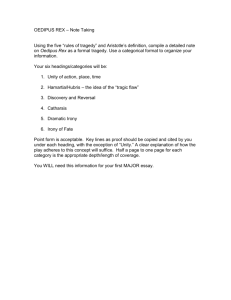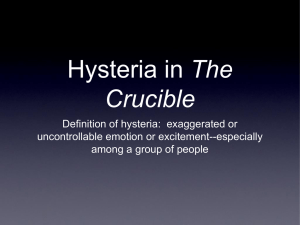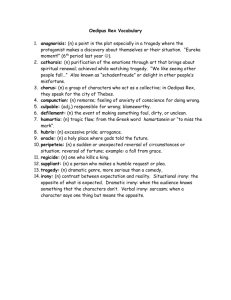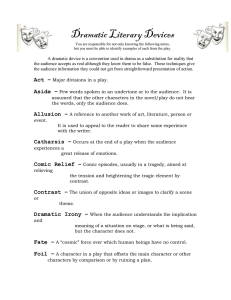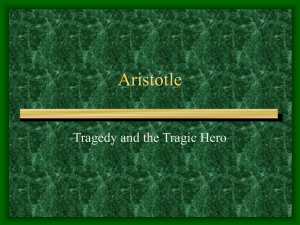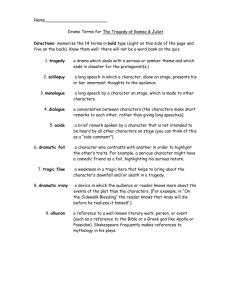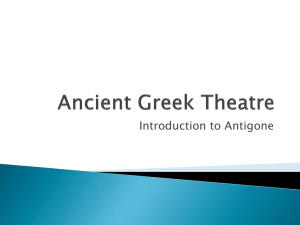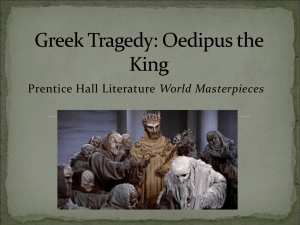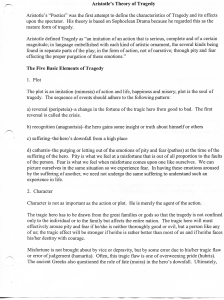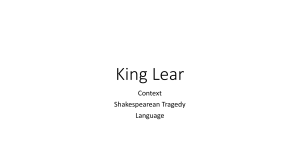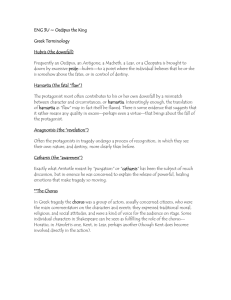TRAGEDY NOTES
advertisement
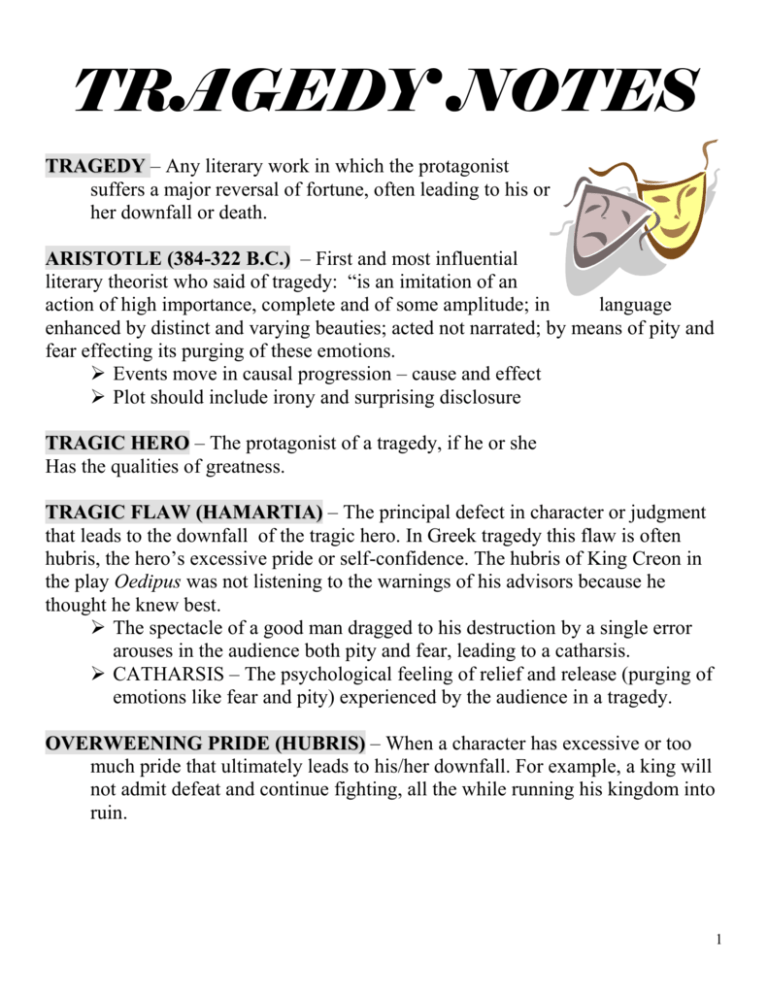
TRAGEDY NOTES TRAGEDY – Any literary work in which the protagonist suffers a major reversal of fortune, often leading to his or her downfall or death. ARISTOTLE (384-322 B.C.) – First and most influential literary theorist who said of tragedy: “is an imitation of an action of high importance, complete and of some amplitude; in language enhanced by distinct and varying beauties; acted not narrated; by means of pity and fear effecting its purging of these emotions. Events move in causal progression – cause and effect Plot should include irony and surprising disclosure TRAGIC HERO – The protagonist of a tragedy, if he or she Has the qualities of greatness. TRAGIC FLAW (HAMARTIA) – The principal defect in character or judgment that leads to the downfall of the tragic hero. In Greek tragedy this flaw is often hubris, the hero’s excessive pride or self-confidence. The hubris of King Creon in the play Oedipus was not listening to the warnings of his advisors because he thought he knew best. The spectacle of a good man dragged to his destruction by a single error arouses in the audience both pity and fear, leading to a catharsis. CATHARSIS – The psychological feeling of relief and release (purging of emotions like fear and pity) experienced by the audience in a tragedy. OVERWEENING PRIDE (HUBRIS) – When a character has excessive or too much pride that ultimately leads to his/her downfall. For example, a king will not admit defeat and continue fighting, all the while running his kingdom into ruin. 1 3 TRAGIC PATTERNS 1) Some plays ask us to look on the sufferings of the tragic hero as a human sacrifice that is necessary to cleanse society. 2) The paradox of the fortunate fall. a) The hero’s destruction is necessary. 3) The simple spectacle of sufferings that greatly exceed normal bounds. a) They futily fight against an inevitable fate that other men don’t have to face. KEY SHAKESPEAREAN TRAGEDIES – “Macbeth”; “Hamlet”; “King Lear”; “Othello” (BIG 4); “Romeo and Juliet”; ---------------------------------------------------------------------------------------------------- IRONY – A contrast or discrepancy between appearance and reality; when the opposite of what you expect to happen happens. DRAMATIC IRONY – the state of affairs known to the audience is the reverse of what its participants supposed it to be. Oedipus flees his homeland to escape his fate of killing his father and marrying his mother, but the readers know he has already done both. SITUATIONAL IRONY – A set of circumstances turns out to be the reverse or opposite of what is appropriate or expected. If someone is rich, wealthy, we expect them to be happy when the opposite might be the case. VERBAL IRONY (spoken) – A contrast between what is literally said and what is meant. This is the most common type. ----MORE MINOR CHARACTERS---FOIL – A character who provides a direct contrast to another character. CONFIDANTE – The person one of the main characters confides in or trusts with personal or secretive information. 2 DRAMA – Written mostly as poetry in the beginning. VERSE – Often used as a synonym for poetry. PROSE – All forms of ordinary writing and speech lacking the sustained regular and rhythmic patterns in poetry. IMPORTANT DRAMATIC CONVENTIONS PROLOGUE – a speech at the beginning of each act that ________________ it in the form of a 14-line poem called a sonnet (often skipped in modern productions) COMPRESSION OF TIME – plot events are forced into just a few days (often one day) to sustain a _________________ story in which time is somehow running out for the protagonist(s) MONOLOGUE – a character gives a long speech with others present in order to review the plot, provide background info, or express a philosophy SOLILOQUY – a character gives a long speech while __________________ on stage, revealing his/her true feelings and motives to the audience ASIDE – these lines are delivered as if they are meant NOT to be heard by one of the characters on stage APOSTROPHE – a character addresses someone who is not present or an inanimate object, a more focused variation on talking to one’s self USE OF DIALOGUE -- establishes EVERYTHING!!! ( ____________________ of day, specific _______________________, characters’ ______________________ and _________________________, even their _____________________ must be pronounced through dialogue) 3 LITERARY DEVICES FOILS – characters who reflect on one another’s opposite natures SITUATIONAL IRONY – the opposite of what would be expected happens FORESHADOWING – hints and clues of what will happen in the end build ___________________________ and enhance the sense of ____________________________ felt by the audience POETIC DEVICES: EXTENDED METAPHOR – a direct comparison of two unlike things (without like or as) that continues more than once. SIMILE – a comparison of unlike things using LIKE or AS PERSONIFICATION – granting human qualities to inanimate objects CLASSICAL ALLUSION – a reference to mythology (usually explained in a footnote) PUN -- a play on the __________________meaning of a word (son/sun, wine/whine, one/won, I/eye/ay) OXYMORON - contradictory terms that nonetheless make sense together; putting two opposing ideas together. ACCENTED SYLLABLES – pronounce a word part that would usually be silent if an accent mark appears above it (blessed, devoured) ELISION (CONTRACTION OF SYLLABLES) – pronounce a word that looks like a contraction without the missing syllable (e’en for even; t’is for it is; banish’d for banished) 4

